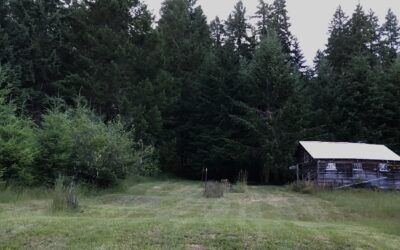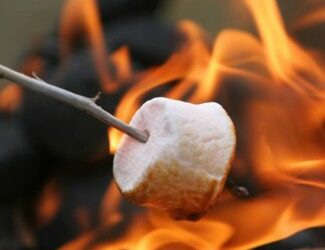Facing Down the Apocalypse VIII: If a Tree Falls
Last evening I dropped a tree over the edge of the world as I know it. The Douglas-fir died in exactly the spot I directed, sent there with a chainsaw and hand-winch. I am not an expert feller of trees, although decades ago I did make my living falling lodgepole pine around what were then million-dollar homes. No harm was done, except for the small issue of a power outage in three towns. I’m sure this momentary mental lapse explains my lifelong practical and theoretical difficulty with electricity.
The tree I felled yesterday was 30 inches on the stump, 60 feet high, and only 26-years-old. Its exuberant life began the same year my family and I moved back to Oregon to restart ours. This rampant growth was possible because the original seed helicoptered in and took root just downhill from the blueberry patch. The tree undoubtedly benefited from surplus summer water and fertilizer. Since the blueberries have been cared for by me for the past ten years, I get some of the credit.
I also take full responsibility for the tree’s early death. Over the decades I have killed tens of thousands of trees, most of them while working as a pre-commercial thinner. Now age has brought me to an uncomfortable juncture. These days I dislike the killing, but reasons compel me to pull the starter cord on the chainsaw, bite through lizard skin bark, and send those resinous chips flying. In this case, the Douglas-fir’s boisterous reach was beginning to shade the blueberries and summer vegetable garden. So I took the gangly adolescent down, one of a thousand daily compromises all of us make every day to remain alive on this death-filled planet.
Other reasons drove me to take the life of this rapidly ascendant being. Two winters ago I had a conversation with the house, which is in a horrible state of disrepair, and asked whether it preferred a quiet death without intervention or reconstructive surgery. We decided that surgery was in order as long as the lumber came from the nearby trees. So in addition to having chainsaws and falling wedges and other implements of tree death, I am now half-owner in a portable sawmill and have the wherewithal to transform dead trees into beautiful lumber.
This has led to a more difficult conversation with the trees because a few of them must die to keep the house alive for another generation. Before I fired up the saw, I explained all of this to the Douglas-fir. Conversations with houses and trees take a long time. I am trying to listen, but have no idea if they hear me.
Now I’m having an even harder conversation with myself. Here at the end of all I thought I knew, on the trailing edge of my own life, why do I persist in pouring energy into this outpost in the Coast Range, this human-made bubble of sunlight and space, only to slow its inevitable return to needle and leaf? The answers are complex and book-length. They weave together six generations of ancestors and descendants with conscious connection to this place. My ego slinks around the edges like a stray cat, manifest as a desire to persist even in the certain knowledge of impermanence. The trees and house and I are now drawn together by death and healing. We are traveling a road that extends beyond the edges of our small lives.
MOST RECENT BLOG POSTS
Facing Down the Apocalypse VII: Solitude
On the front porch of the Johnny Gunter place, I ride the incoming swell of nightfall. The last logging rigs rumbled out of the valley two hours ago. A single robin chirrups from the meadow growing April green before me. Wind from the west draws an iron overcast across the evening sky.
Facing Down the Apocalypse VI: Rough-skinned Newts
There sure is a lot of sex at the end of the world as I thought I knew it. After a socially distant run on the chip trail, I finish with a sweaty stroll through the neighborhood park, pausing on a footbridge across the small creek. The air has become a breathing thing, ribs of willow and cottonwood exhaling …
Facing Down the Apocalypse V: Coping Strategies
When I don’t feel like writing, I go for a run. But too much running makes my knee swell.
When I don’t feel like running, I have developed an ingenious strategy: I don’t run. I don’t write either.
When I don’t feel like writing or running, I split firewood.




0 Comments